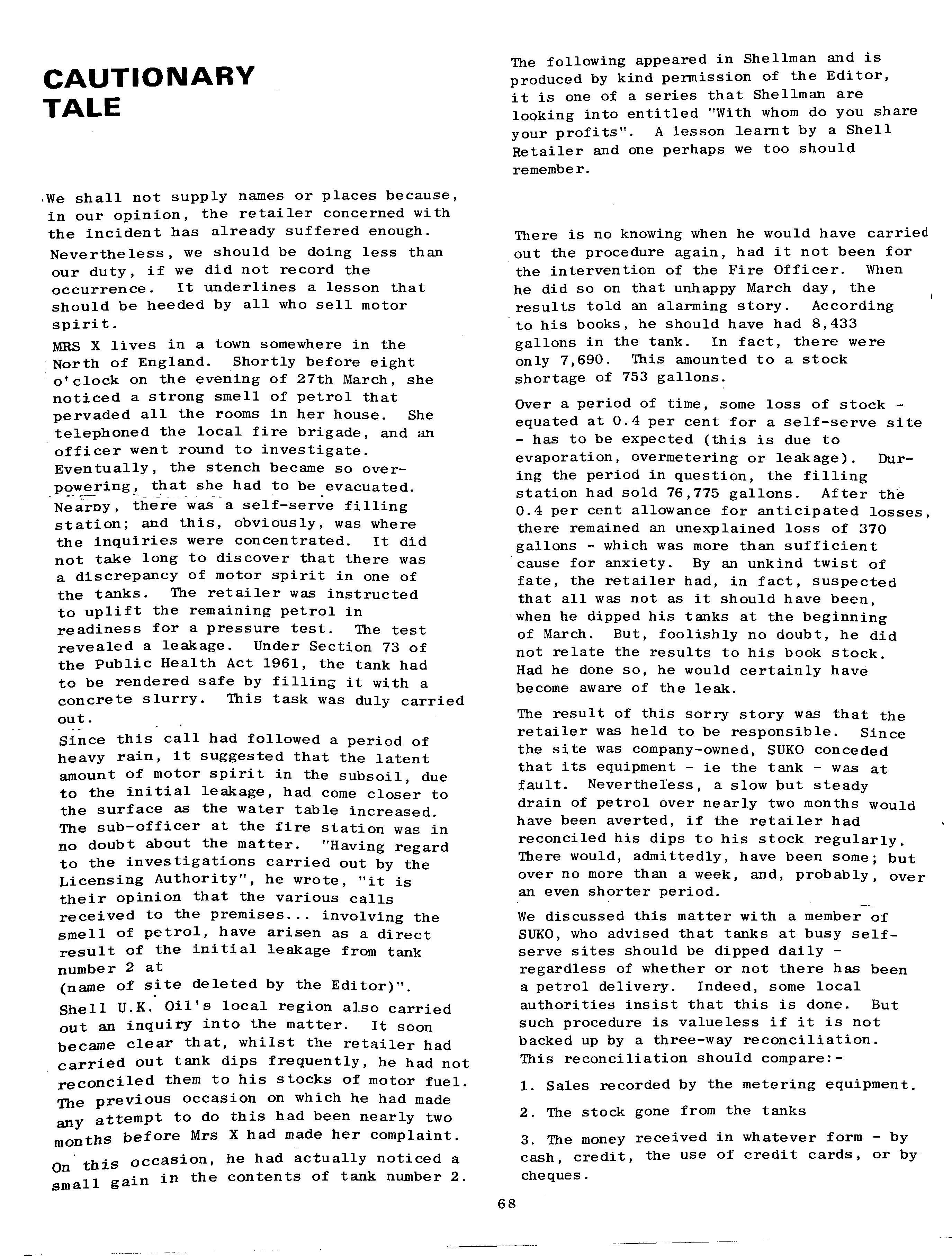
3 minute read
Humberside Annual Report
"After all", he told us, "if Securicor delivered a consignment of gold ingots valued at £1 each, you wouldn't just dump them in a hole in the ground and forget about them".
A three-way reconciliation is necessarv since electronic equipment, no matter how good it may be, can go wrong. By carrying out this procedure you are not only ensuring that valuable supplies of petrol are not seeping away; you are also making certain that everything is functioning properly.
Advertisement
In the case recorded here, the inconvenience caused to Mrs X must have been considerable. The retailer, too, was a victim. By letting nearly two months elapse in what should have been a daily task, he lost a considerable sum of If any good at all can emerge from thlS matter, it can only be that it may serve to remind other retailers to pay the necessary attention to stocks of petrol. Motor spirit is much too valuable a commodity to be lost through carelessness.
HUMBERSIDE
This is an extract from the Annual Report of the Humberside County Council Trading Standards Department for the year 1978/79
PETROLEUM
The cost of petroleum spirit now competes keenly on any list of "most unpopular" subjects; it frequently being referred to as "liquid gold". If this situation results in every drop of the precious commodity being carefully stored and used there might be a welcome reduction in its' other price; that is the national average yearly bill of 11 dead and 70 injured as a result of accidents involving petroleum spirit.
The greater acceptance by employees and members of the public of petroleum as a "very safe" commodity to have on our streets and in our town centres can lead to complacency. The Department is well aware of the associated dangers and makes every. effort to cut the death and injury cost of petroleum spirit by eliminating it within the county.
In this context the Department this year carefully studied and approved plans and proposed sites for the installation of 30 underground tanks of a total capacity of 98,600 gallons, the construction work being monitored at all stages to ensure that all safety objectives were achieved. However, during the year, one particular company saw fit to store 20 forty-five gallon drums of petroleum spirit in unlicensed premises which did not meet the Department's standards. The company . was charged with storing in an illegal manner and made to meet the cost of the transgression in the form of a £100 fine.
These days of electronic sophistication have not by-passed our forecourts. There is no doubt that the rapid increase in the price per gallon of petrol placed a great burden on petrol pumps. Higher prices mean t faster rotation of price drums. TIle wear of moving parts vastly increased and paved the way for electronic digital displays, plus numerous other pieces of electronic wizardry, including electronic pre-setting of pumps for quantity and price, rapid cross checking for gallonage dispensed against cash taken and also the quantity of fuel unsold still remaining in the storage tanks.
Such an abundance of electronic equipment underlined the need for ensuring that all the electrical safety aspects were maintained.
In order to meet this, licensees are required to submit to the Department a certificate from an "approved" electrical engineer certifying the licensed premises as being electrically sound.
During the year, failure to submit such a certificate resulted in a licensee being prosecuted and further investigation of his premises revealed other contraventions which resulted in fines totalling £45 being imposed.
Routine work is usually the most essential, of utmost importance and the most tedious.
Perhaps the most routine task of the licensee . . h lenishmen t is the close supervls10n of t e rep of his underground storage tanks. Standing alongside a eye" on the . tanker and keeplng a tde li very pipe connec "watchful · the lng tanker to the storage tank can be very tedious. No matter how tedioUS, it is a most important statutory duty and one that all licensees have to strictly adhere to, ensuring that the thousands of gallons of petroleum spirit delivered every day get to their proper destination in the storage tanks, and do not flow uncontrolled over forecourts. Comment has been made so far on petroleum storage tanks in use, but a very important aspect of the Department's work begins when a tank reaches the end of its useful life. Such tanks are likely to have the potential of buried unexploded bombs. It is of paramount importance to render them safe as soon as possible. In orde r to do



